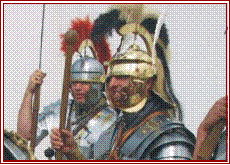
|
To contact us: |


|
There were several different sorts of optio in the Roman army whose tasks and rank differed. The word itself means 'chosen man' and it was used for various soldiers and non commissioned officers. |



|
The optio was distinguished by the use of a tipless spear with a round or mushroom shaped head used to keep the troops in order. Though in some publications it is stated that he was also recognisable by the use of two sideplumes there are no indications in the available sources that this was so. Depictions of Roman soldiers show that sideplumes were used by troops of differing rank, including rankers and cavalry standard bearers, and hardly limited to - or associated with the optio. |

